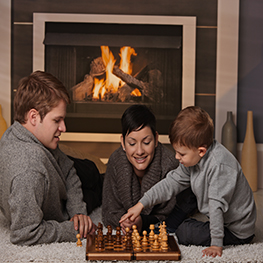
Brain science is a quickly growing field with many institutions making this a priority for research funding. With increasing knowledge about the brain has come growth in production and sales of ‘brain-based’ games and programs.
Parents wanting to help their children and give them an edge in their education may decide to buy brain-based games. Parents are asking: ‘What is the true value of these products?’
What to know
Research is limited and mixed in findings regarding brain training games and programs that are claimed to be based on brain science. These games and programs often improve ability to perform the particular task trained, but do not necessarily lead to the promised brain development. Although some products have shown some promising results, these tend to be in the minority. Simple and affordable tasks are more effective in developing thinking and learning abilities. Exercise and physical activity, playing and socializing with friends and family, pursuing artistic activities - drawing, painting, practicing a musical instrument - healthy sleep and maintaining a healthy balanced diet all have positive impacts on lifelong brain development and have the added benefit of promoting general physical health and strengthening mental health.
What to ask
If you decide to buy the latest brain-building product, be a smart consumer and ask questions. What is the cost? Brain-friendly activities need not come with a large price tag. If a program is very expensive, it doesn’t necessarily mean it is more likely to promote brain development. You also need to consider what fits into your own family budget. As mentioned, there are many brain-friendly activities that you can choose for free or are low cost. These can include exercise that sustains an increased heart rate like jogging, skipping or biking, city or school organized sports, music and art activities, and playdates and clubs with friends.
What does the research say?
Be a smart consumer. Investigate the brain-claims for yourself before buying a product or program - you can find quick information if you google the product, read parent magazine reviews or read research summaries.
Are there any red flags?
Look for signs that a product or program is less than what is promised:
All research supporting the program or product is headed by the company promoting the game (i.e. the people doing the research work for the company that will benefit from the sales).
The ‘research’ is based only on stories from satisfied customers (i.e. a lot of positive stories does not equal evidence).
Research supporting the program or product is focused on how the person improves from the beginning to end (i.e. not clear that improving in the program or using the product translates to improving in academic achievement).
Independent research says there is no evidence the product works (i.e. researchers outside the company do not support product or program claims).
Hefty price tag (i.e. this plays into consumer belief that things with a higher cost have an inherent higher value, which is not always the case).
Product or program claims are too good to be true (i.e. large promises of changes in how the brain works generally have little evidence base).
What to consider
Parents want to help their children and give them every advantage in life. We suggest choosing simple and free or low-cost brain-friendly activities are the best investment not only to promote healthy development of the brain, but also for healthy development of the whole-child. When looking for brain-friendly gifts, we think simple choices are best. There are many simple alternatives that have the added potential of playing competitively or cooperatively with friends and family.
Consider classic strategy games (checkers, chess, Pente), thinking skill games (Guess Who, Memory, Matching, Simon, Perplexus - 3D maze ball, Mastermind, Battleship), jigsaw puzzles (2D puzzles - include more challenge by choosing a uniform picture or larger number of pieces - and 3D puzzles), word or number puzzles (Scrabble, Suduko, Crossword or Word Search books), building sets (Mega Blocks, Lego and K’Nex model sets), arts & crafts sets (Crayola kits, Play Doh or modelling clay, coloring or painting books) or musical instruments and lessons. Many of these games and puzzles come in versions for both younger and older children as well as digital online versions. When it comes to more expensive products, our best advice is to approach brain products and programs with a healthy scepticism and do your research before you buy.
Dr. Harriet N. Johnston, R. Psych., has been working in the education field for 17 years as a school psychologist. She teaches university courses on educational psychology topics for teachers and psychologists in training. Dr. Johnston recently completed additional academic degrees in neuropsychology and neuroscience with experience in brain imaging. Dr. Johnston can be contacted at This email address is being protected from spambots. You need JavaScript enabled to view it.. Dr. R. Coranne Johnson, R. Psych., has been working in the education field for over 25 years as a teacher, administrator and school psychologist. Dr. Johnson can be contacted through her website, www.helpingchildren.ca.
Calgary’s Child Magazine © 2025 Calgary’s Child